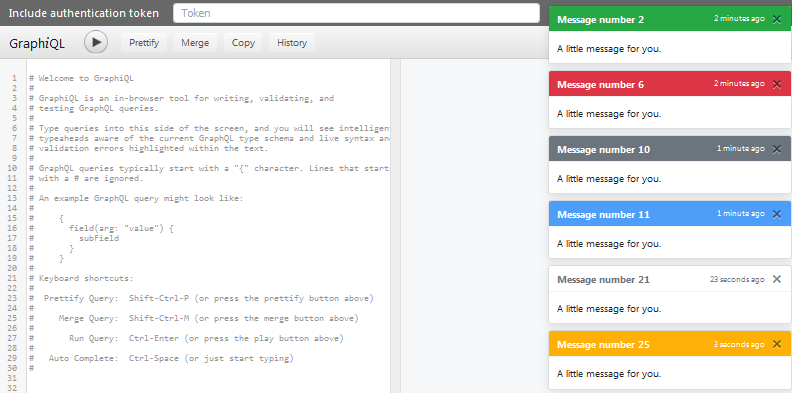GraphiQL-Auth-Token
A React subclass of GraphiQL allowing you to add an authentication token from the user interface and to pop up notifications from the server.

Demo
Try the live demo. It is implemented in this other package: GraphQL Auth Service, a customizable authentication service working with express-graphql.
# Enter the following queries replacing the username, email and password # # First mutation # Second mutation # Third - you need to pass the token fetched in the second query queryInstallation
npm install --save graphiql-auth-token
Alternatively, if you are using yarn:
yarn add graphiql-auth-token
Adding an authentication token
GraphiQLAuthToken offers the same properties as GraphiQL as it is its subclass. It just requires one more property, onTokenUpdate: a callback function that will be called whenever the user enter / update the auth token. You can use it to store the token and include it inside the fetcher.
;;;; let token = null; const graphQLFetcher = { const headers = 'Content-Type': 'application/json' if token headers'Authorization' = 'Bearer ' + token; return ; const onTokenUpdate = token = newToken; const style = position: 'fixed' height: '100%' width: '100%' left: '0px'top: '0px' ReactDOM;To know the rest of the properties available, please refer to GraphiQL documentation.
Sending pop-up notifications
You can display notifications from the server by using for instance socket.io. You just have to pass each notification into the notification property of the component. It can contain the following attributes:
const notification = title: "Notification title" // Mandatory message: "Notificaiton message" // Mandatory type: "info" // Possible values undefined | "secondary" | "success" | "info" | "warning" | "danger" date: // If not specified, it will be automatically setThe title and message can contain HTML tags.
Find a minimal example below or look at complete one with the client here and the server here.
;;;; { super; thisstate = notification: null } { thissocket = ; //Server addess to adapt thissocket; } { thissocket; } { const graphQLFetcher = ...; // To complete const style = position: 'fixed' height: '100%' width: '100%' left: '0px'top: '0px' return <div style=style> <GraphiQLAuthToken fetcher=graphQLFetcher notification=thisstatenotification /> </div> } ReactDOMUsage with express-graphql
To use GraphiQL-Auth-Token inside express-graphql instead of the regular GraphiQL please refer to this example.
